When you have puppies at home, it’s natural for questions to arise as you strive to be the best pet parent possible. From choosing the right food to figuring out the best way to hold and train your young pups, there’s no shortage of concerns.
One crucial aspect that often leaves pet owners wondering is how much water their puppy should drink. Proper hydration plays a vital role in your puppy’s overall health and well-being.
In this informative blog post, we will delve into the topic of your puppy’s water intake and address common concerns. From understanding why proper water intake is essential for our furry companions to recognizing the signs of dehydration, we’ll quench your thirst for information about puppy hydration.

PetSafe Oasys 1 Gallon (128 Ounce) Medium Pet Fountain - Cat or Medium Breed Dog Water Fountain - Dishwasher Safe Filtered Water Dispenser with Flow Control - Filters Included - Easy to Clean
View on Amazon
Hubulk Pet Dog Bowls 2 Stainless Steel Dog Bowl with No Spill Non-Skid Silicone Mat + Pet Food Scoop Water and Food Feeder Bowls for Feeding Small Medium Large Dogs Cats Puppies (S, Pink)
View on AmazonWhy Is Water Important?
It is important that dogs and puppies consume the right amount of water. Drinking water serves several important benefits for their overall health and well-being.
Hydration
We must ensure that our growing pups drink the right amount of water per day. Proper water intake prevents your pet from getting dehydrated.
Adequate hydration is essential to maintain proper bodily functions. Water helps regulate body temperature, facilitates digestion, and promotes the circulation of nutrients and oxygen throughout the body. It prevents dehydration, which can lead to serious health issues and discomfort.
Regulates Organ Functions
Water also helps regulate digestion and other bodily functions.
Sufficient water intake helps prevent issues like constipation. It softens the stool, making it easier for dogs to pass waste. It also reduces the risk of gastrointestinal discomfort and potential complications.
Water is also essential for the optimal functioning of various organs within a dog’s body. Adequate hydration supports healthy kidney and liver function, allowing for the filtration and elimination of waste products. It also helps maintain healthy liver function.
A dog needs the correct amount of water intake as well for proper blood circulation. It results in better brain development and overall well-being.
Aids in Lubrication of Body Tissues
Water aids in joint lubrication. It lubricates the body tissues of your growing puppy for better muscular development.
Sufficient hydration ensures that the connective tissues remain well-nourished, reducing the risk of joint problems and promoting overall mobility and comfort.
Distributes Nutrients in the Body for Better Absorption
Water plays a critical role in the distribution of nutrients in the dog’s body. It transports nutrients from food all throughout the body for better absorption.
It also helps dissolve and carry essential vitamins, minerals, and other nutrients, allowing their efficient utilization by the body. Without sufficient water, the digestion and absorption processes can be compromised.
Provides Energy
Adequate water intake is essential for dogs to maintain their energy levels and perform at their best. Hydration supports physical endurance and improves overall stamina.
It also cools down body temperature, preventing your puppy from being lethargic and guarding against fever.
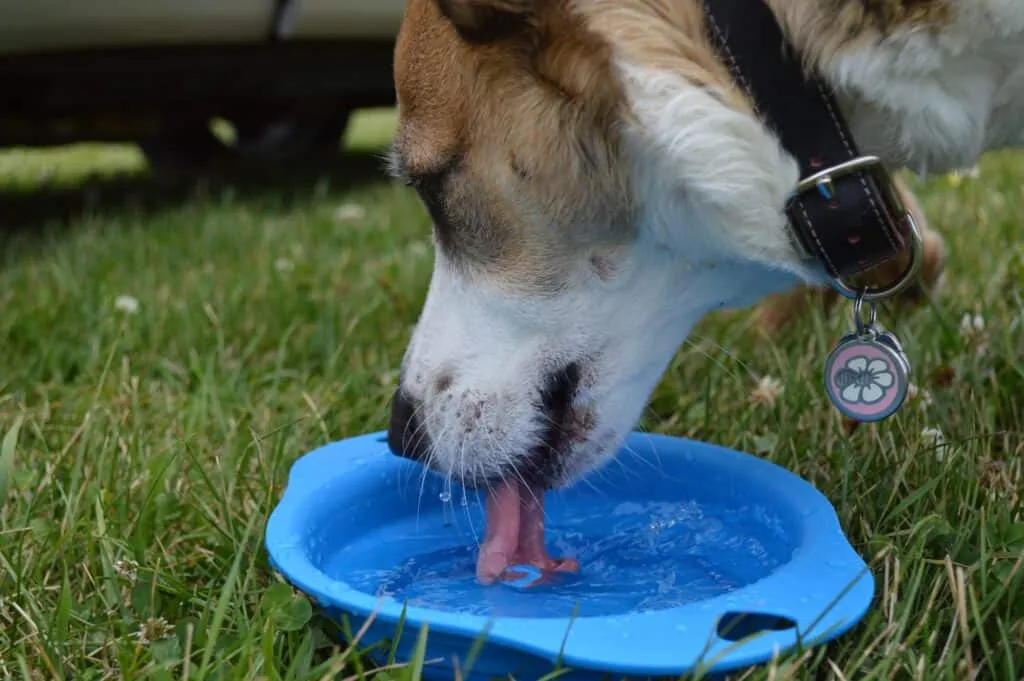
How Much Water Should A Puppy Drink?
We all know that keeping our puppy hydrated is important to keep him away from health issues caused by the lack of it (like dehydration, for one).
The amount of water a puppy needs is, of course, less than that of adult dogs. As these young pups are still growing and drinking their mothers’ milk, they tend to consume less water.
On the other hand, older puppies, especially those starting to eat solid foods, need a regular intake of fresh water daily.
The General Rule
A good rule to go by is about an ounce of water per pound of body weight per day.
To illustrate, assume that your pup is not into too much physical activity. A 10 lb. puppy should drink 10 ounces of water daily. And a 20-pound dog may need around 20-30 ounces of water intake daily.
However, this is not a fast rule to strictly go by. The amount of water your dog drinks may vary depending on its size, age, activities, and other factors. Hence, in some instances, it is alright not to observe strictly the above general rule.
When your puppy is into many activities, exercises, and playtime, his body needs more freshwater to stay well-hydrated. Depending on your puppy’s activity level, make sure to give your pet, on average, a cup of water every two hours.
Bringing a portable dog water bottle like this would ensure that your pet never runs out of water.
When the temperature is high, your puppies need to drink more to replenish the amount of water they sweat off.
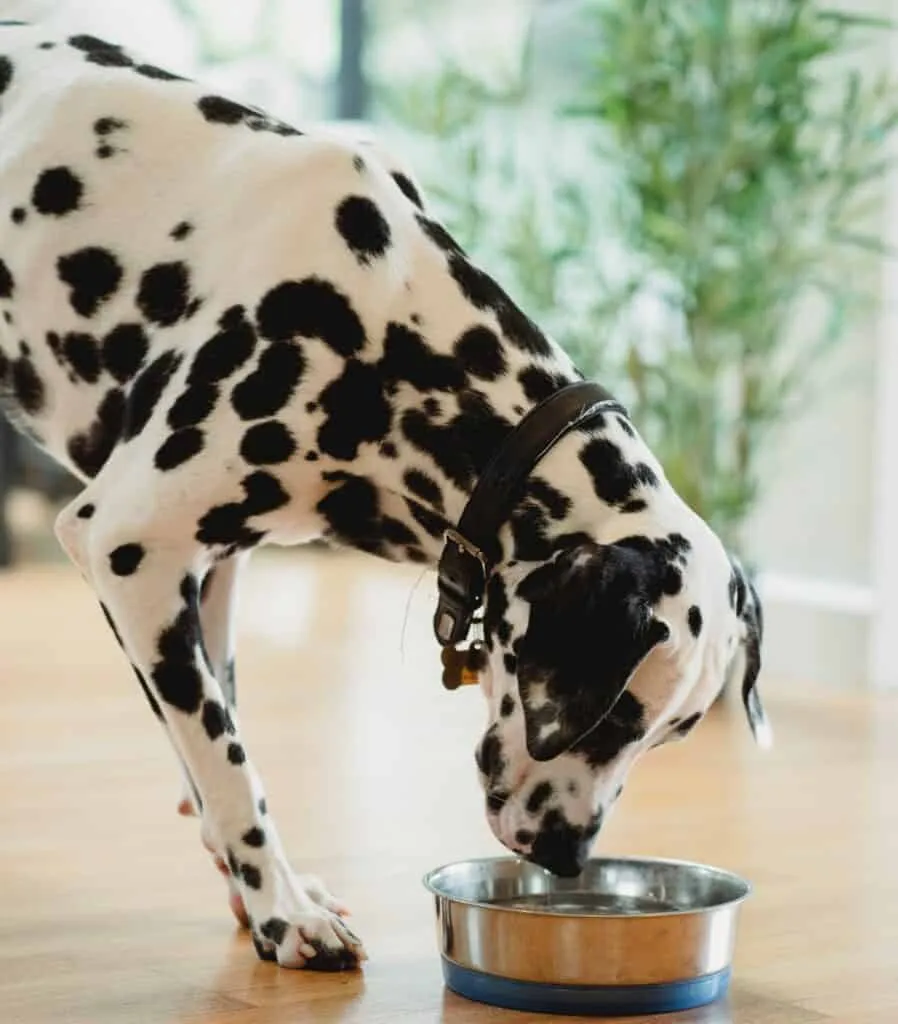
Over-Hydration
Overhydration happens when you put too much in your pet’s water bowl, and your puppy drinks uncontrollably. Also known as water intoxication, overhydration causes the imbalance of electrolytes in the dog’s body.
It may also happen when our pups go swimming or play in the water and take in, unintentionally, excessive water.
Too much water intake can affect our dog’s health and cause them to get sick.
Can You Give A Puppy Too Much Water?
Simple answer: yes! Drinking too much water can be as dangerous as dehydration.
When our young dogs are starting to drink water, it is important to keep a close eye on them. Ensure that they are drinking enough water every day but never too much.
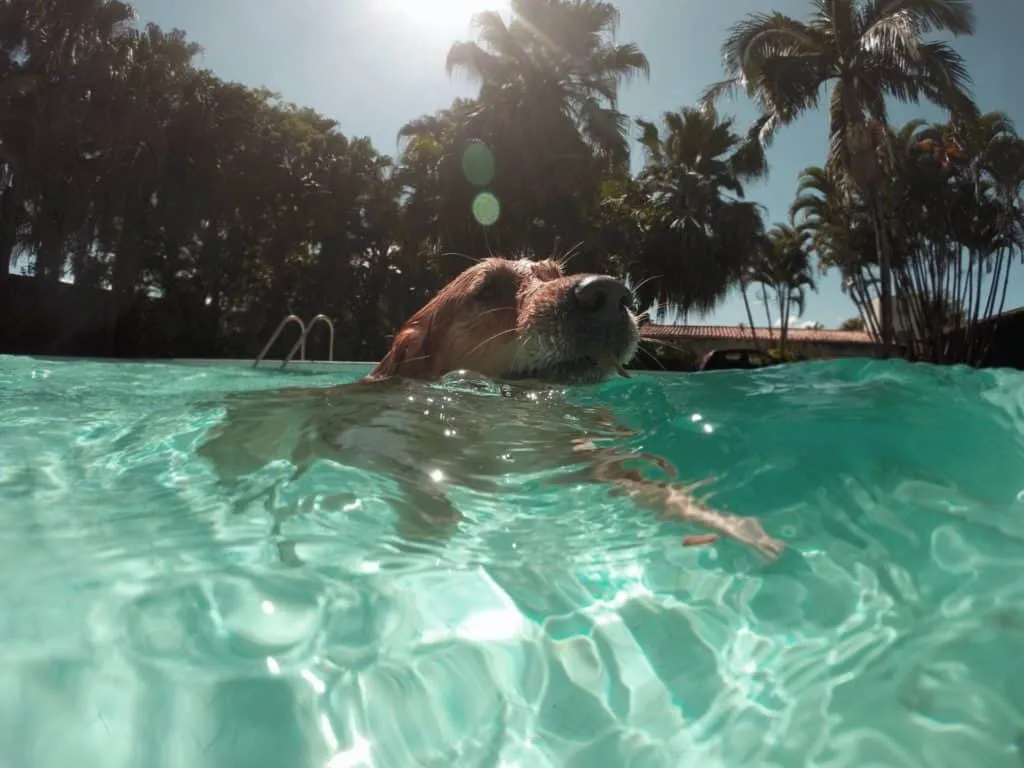
When you think your puppy drank too much water, observe if he manifests symptoms of overhydration. These symptoms include nausea, vomiting, bloating, dilated pupils, loss of coordination, pale gums, and salivation.
If any of these signs are apparent and you fear your dog may be overhydrated, take him to the vet for a proper diagnosis. Your veterinarian will also prescribe the proper remedy for the same.
Why Does My Puppy Drink So Much Water?
It is also worth visiting the vet as excessive drinking among dogs may be a sign of a more complex ailment. These internal complications include kidney disease, diabetes, and infection of the uterus, among other health concerns.
Of course, this is only worrisome when, given normal circumstances, your puppy still drinks excessively.
During summer days, it is normal for our young furry pets to drink more water than what they usually intake on a much cooler day due to the high temperature. Drinking water is their way of cooling themselves.
On days when your pups are undergoing training, exercises, or playtime, your furry friends may need to drink more as they sweat off some of the liquid on their bodies and need to get back some of the fluids they lost.
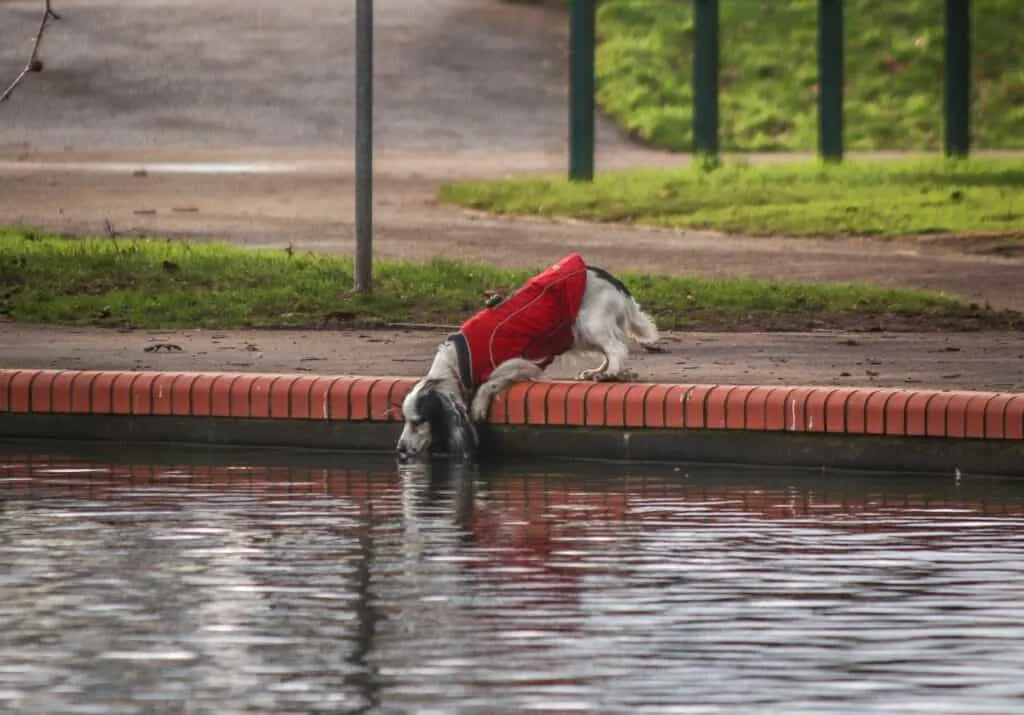
Dehydration
There may be a day when your pups will be drinking too little water. When this happens, they risk being dehydrated.
Canine dehydration happens when our furry friends consume less water than what their bodies require.
Besides not drinking enough cups of water daily, dehydration can also happen when our puppy frequently vomits, has excessive urination, or has diarrhea. When your dogs experience any of these ailments, we must immediately take them to the vet for proper medication.
When your dog starts eating solid foods, his water intake must also be monitored. Dry dog food requires water to be digested.
Without enough water intake, this dry dog food utilizes the body fluids in our dogs during digestion. Hence, not drinking enough can cause dehydration.
How Do You Know When Your Puppy Is Dehydrated?
You would know that your dog is dehydrated when his average freshwater intake is far less than your veterinarian’s recommended or proposed in the general rule mentioned above.
Of course, strict adherence to the said rule is not required as it may vary depending on your dog’s activity level, age, size, and other factors. However, if you cannot monitor how much water your dog drinks or are unsure that your dog is getting enough water to keep him healthy, other signs could indicate a lack of water intake.
To check that your dog is drinking enough water, hold your puppy, stretch out a piece of skin along his neck, and then let it go.
Notice how fast the skin snaps back. The skin should snap back into place immediately.
If it does, as far as his water intake is concerned, your pet is healthy, and there’s no need to worry. But if the skin snaps back into place slowly, your puppy might be experiencing dehydration.
You could also identify if your dog is dehydrated by running a finger on your dog’s gums. If they are dry or sticky, it is an indication that he needs more water.
Another way would be to press the skin on the gums. While pressing his gums, you will notice that the skin will turn white.
Immediately release the pressure and observe how fast (or slow) the skin turns back to its pinkish color. If it takes longer than 2 seconds, then your puppy needs more water.
How Long Can A Dog Go Without Drinking Water?
In general, dogs can survive without water for approximately 2-3 days. But note that just because they can survive without water does not mean it’s alright not to give them any.
The lack of water in the body could harm their system, which would affect their vital organs. The failure of the vital organs to perform properly may cause our dogs to be seriously sick and could even be fatal.

How To Make Your Puppy Consume More Water
Some dogs are not just fond of water. If your dog is one of them, it is important to remedy the situation and get him to drink more to keep your dog in the best of health.
To achieve this, you could try the following easy tips.
Always make sure that your dog only drinks fresh, clean water. Water that has been in your dog’s water bowl for some time does not seem to be too enticing to drink. Replace the water in the bowl after it has stayed there unconsumed for some time.
Just with any other training, give your pup some treats every time he drinks water. Reward your pup with positive reinforcement to encourage him to drink water. Over time, your dog will associate drinking water with a reward and will develop the habit of drinking regularly.
Put his water bowl near his food bowl to encourage your dog to drink after every meal. Sometimes, your dog forgets to drink water after eating since he cannot find his water bowl after a meal. You can also use water and food feeder bowls together.
You could add up some water supplements to make the water more palatable for your dog. We know that water is tasteless. Your dog has the same perception. Adding some flavors to the water will get them to drink more. This one comes in chicken flavor, but, of course, you could get any other flavor your pet loves.
Let your dog drink by lapping or chewing through ice cubes. Make sure, though, that your pup is not experiencing any ailment that could be triggered by the coldness of an ice cube (like a toothache, for example).
Accessorize. Using a dog water fountain like this one may encourage your dog to drink more as it is like having fun while drinking.
Getting your dog some wet food or mixing his dry food with a bit of water can add to your dog’s water intake. Eating wet food would provide some fluids in his body.
If these home remedies do not work, take your pet to the veterinarian. Your veterinarian would know better how to address this concern.
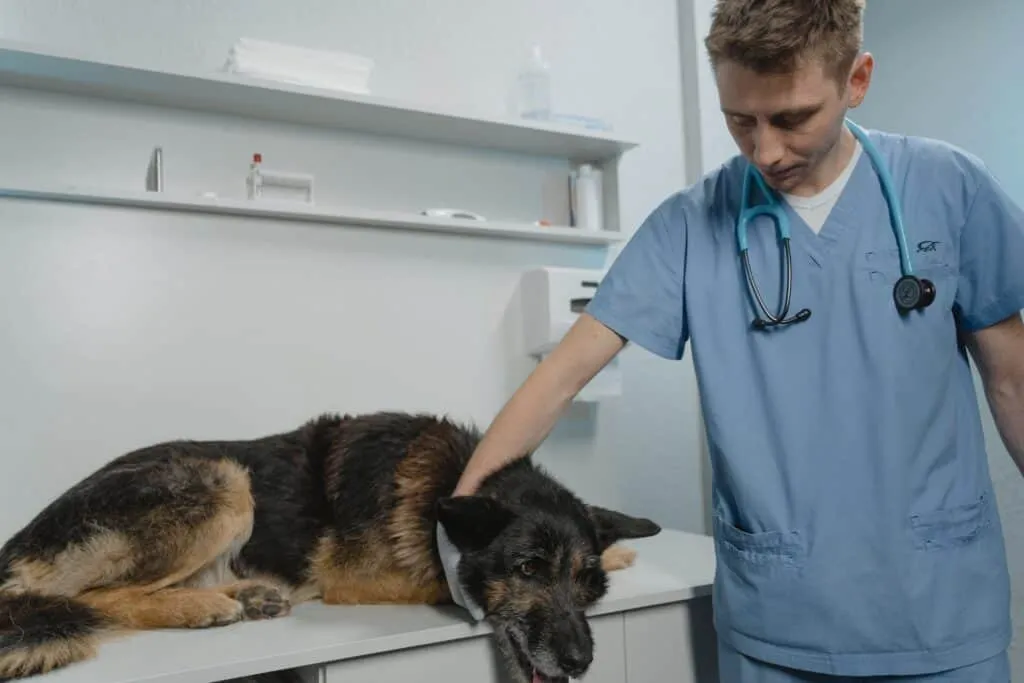
Final Thoughts
How much water should a puppy drink? There is no definite answer to this question.
Remember, every puppy is unique. Their water intake varies depending on their age, size, activity level, and even the weather conditions.
Monitoring your puppy’s water intake is an essential responsibility as a pet owner. Adequate hydration is crucial for your puppy’s overall health, digestion, and energy levels.
Consult your veterinarian if your dog drinks too little or too much.
